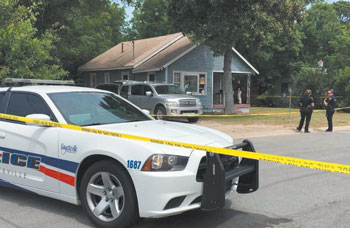 There was a day not long ago that Fayetteville had a reputation for being the crime capital of North Carolina. In 2016, the city recorded an all-time high number of local homicides, 31. As of Dec. 12, 2019, the most recent data available from police, 24 murders had occurred this year. Raleigh reported 29 homicides, Durham reported 23 and Charlotte more than 100.
There was a day not long ago that Fayetteville had a reputation for being the crime capital of North Carolina. In 2016, the city recorded an all-time high number of local homicides, 31. As of Dec. 12, 2019, the most recent data available from police, 24 murders had occurred this year. Raleigh reported 29 homicides, Durham reported 23 and Charlotte more than 100.
Charlotte Mayor Vi Lyles took the oath of office three weeks ago and immediately turned her attention to reducing violence as news broke of another resident’s murder. The mayor called for closer collaboration among city and county governments, as well as the police department and the district attorney’s office, to develop new strategies to combat the soaring homicide rate.
As the swearing-in ceremony took place, the Charlotte-Mecklenburg Police Department reported the city’s 103rd homicide of the year. There were 58 murders in Charlotte in 2018.
“We must change the path we have taken this year,” Lyles said of the homicides.
The latest crime report for Fayetteville is a variety of ups and downs. Fayetteville Police Chief Gina Hawkins gave her third-quarter report on crime statistics to Fayetteville City Council Dec. 9. Through September of this year, there were 66 rapes reported compared to 81 in 2018, a 19% decrease. But through the first nine months of this year, there were more aggravated assaults and robberies than last year.
There were 292 felonious aggravated assaults through the end of September compared to 269 during the corresponding period of 2018. Shootings and other serious injury crimes are included in that category. “Ultimately, we are a safe community,” Hawkins told City Council. Preventing crime is not just law enforcement’s job; it is everybody’s job, Chief Hawkins believes.
There are a variety of ways citizens can take action to reduce crime, like mentoring at-risk youth, reporting incidents and encouraging lawmakers to pass bills designed to reduce crime. Crime prevention starts with community involvement. If your neighborhood has a neighborhood watch program, join it. If it does not, start one.
There’s more to preventing crime than stopping would-be criminals in the act. You can help keep people from becoming those would-be criminals by volunteering your time and donating money to social programs that help at-risk youth, like Big Brothers Big Sisters of America.
In 2018, the Fayetteville Police Department investigated seven domestic-related homicides. A domestic violence unit was formed to prevent or address domestic violence cases. The concept involved comforting and interviewing family members and neighbors. This year’s third-quarter crime report indicated none of the 24 murders was related to domestic violence.
However, the connection between drugs and violence continues to be a problem. The correlation between substance abuse and violent behavior is well documented. The Journal of Substance Abuse Treatment noted that more than 75% of people who began treatment for drug addiction report having performed various acts of violence, including mugging, physical assault and using a weapon to attack others.
Fayetteville homicides down from 2016
- Details
- Written by Jeff Thompson